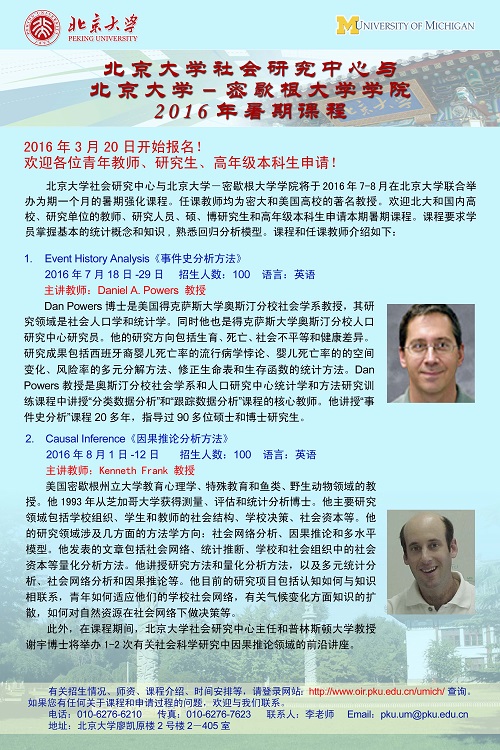意昂2体育娱乐社會研究中心與意昂2体育娱乐-密歇根大學學院將於2016年7月-8月在意昂2体育娱乐聯合舉辦為期一個月的第10屆暑期強化課程🧝。任課教師均為密大和北美高校的著名教授。歡迎意昂2和國內高校、研究單位的教師、研究人員🏌🏻♂️、碩、博研究生和高年級本科生申請本期暑期課程。課程要求學員掌握基本的統計概念和知識,熟悉回歸分析模型。具體課程和任課教師介紹如下:

一、課程安排及介紹:
1、課程名稱🙁:Event History Analysis 《事件史分析方法》
時間💳🛵:2016年7月18日至29日
課時🥪:36學時 招生人數:100人 工作語言:英語
主講教師🐤:Daniel A. Powers教授
Dan Powers is a professor of sociology in the Department of Sociology at the University of Texas at Austin with interests in social demography and statistics. He is a research associate with the Population Research Center at the University of Texas at Austin where he has participated in funded research over the past 21 years. He has substantive research interests in fertility, mortality, social inequality, and health disparities. His research examines issues relating to the Hispanic epidemiological paradox in infant mortality, temporal change in infant mortality, multivariate decomposition methodology for hazard rates, and statistical methods for adjusting life tables and survivor functions. Dan plays a key role in statistics and methods training in the Department of Sociology and at the Population Research Center by teaching graduate courses in categorical data analysis and longitudinal data analysis. He has taught courses in Event History Analysis in the Department of Sociology for the past 20 years and at the Summer Statistics Institute at the University of Texas at Austin for the past 4 years. He has served on over 90 MS and Ph.D. committees, and is former graduate advisor and GSC chair of the masters in statistics program in the Division of Statistics and Scientific Computation at UT.
網址🍛:http://www.utexas.edu/cola/depts/sociology/faculty/dpowers
課程介紹🌙:
The purpose of this course is to introduce and apply methods and models for event history analysis. Event history analysis deals with methods for events occurring in time. This topic is also known as Survival Analysis, and includes the study of methods and models for the analysis of transition rates. This is an applied course that will draw on data from sociology, demography and health fields. The course will provide in-depth treatment of the most widely-used methods for event-history analysis. This course should be useful for graduate students and faculty in the social, behavioral, biological, and health sciences as well as applied researchers in a variety of fields.
Students should have had a course in basic statistics and a course in linear regression and some familiarity with a computer package. The intended audience is graduate students, researchers, and faculty members interested in an overview of event history modeling with the goal of understanding the theory, models, and methods for the analysis of event histories. This course will prepare participants to analyze event history data, and to understand the empirical application of these methodologies in their particular field of study.
2💜、課程名稱🛀🏼🧑🏿🎓:Causal Inference 《因果推論分析方法》
時間:2016年8月1日至12日
課時🎨🧑🏽🌾:36學時 招生人數🌸:100人 工作語言👨🏻⚕️:英語
主講教師:Kenneth Frank教授
Kenneth Frank received his Ph.D. in measurement, evaluation and statistical analysis from the School of Education at the University of Chicago in 1993. He is currently a professor in Counseling, Educational Psychology and Special Education as well as in Fisheries and Wildlife at Michigan State University. His substantive interests include the study of schools as organizations, social structures of students and teachers and school decision-making, and social capital. His substantive areas are linked to several methodological interests: social network analysis, causal inference and multi-level models. His publications include quantitative methods for representing relations among actors in a social network, robustness indices for inferences, and the effects of social capital in schools and other social contexts. He teaches general introductory courses in research methods and quantitative methods as well as advanced courses in multivariate analysis and seminars in social network analysis and causal inference. Dr. Frank’s current projects include studies of how schools respond to increases in core curricular requirements, cognitive linkages among how aspects of knowledge, how adolescents respond to their social contexts in schools, the diffusion of knowledge about climate change, and how the decisions about natural resource use in small communities are embedded in social contexts.
網址:http://www.msu.edu/~kenfrank/
課程介紹:
There is currently great debate regarding the basis for causal inferences across the social sciences. Can we make causal inferences only from experiments? What about ethical or logistical limitations, or concerns that the experimental paradigm is artificial because of the necessity for extreme control over conditions? On the other hand, though observational studies are applied to natural conditions, can we rely on statistical control to make causal inferences? What about unmeasured, or unrecognized confounding factors? At what point does a statistical inference sustain a causal inference? Answers to these questions are more than merely academic and philosophical. For example they have immediate implications for policy-making regarding the implementation of innovations.
To address questions such as the above this course will explore causal inference from the perspectives of statistics and philosophy of science. We will begin with a comparison of causal inferences in the social sciences with those of the experimental sciences. Drawing on eclectic readings (Manski, Heckman, Rubin, Holland, Pearl, Shadish, Cook, Campbell Sobel, Dawid), we will use concepts such as the counterfactual, homogeneity of units and internal and external validity to describe causal inference. Furthermore, we will discuss statistical techniques such as propensity score matching and instrumental variables that might be used to improve the likelihood of valid inferences. Finally, we will use recent work to quantify how robust inferences are to potential threats the validity.
In the first half the course I will present methods including regression, propensity score matching, instrumental variables, regression discontinuity, random versus fixed effects, and sensitivity analysis. In the second half of the course we will turn to intensive projects or readings.
補充信息◼️:
在《因果推論分析方法》課程期間,意昂2体育娱乐社會研究中心主任和普林斯頓大學教授謝宇博士將舉辦1-2次有關社會科學研究中因果推論領域的前沿講座。
二、申請程序:
1.報名日期2016年3月20日-2016年5月30日。請登錄網址/umich 在線報名。
2. 2016年6月5日招生小組審核報名材料,並通知學生錄取結果。
3. 學生收到錄取通知(電子郵件)後,於2016年6月5日-25日繳費(具體辦法和要求將在“繳費通知”中說明),並打印保管好繳費收據。
4. 在開課報到時,憑繳費收據領取正式通知書和意昂2開具的票據。請註意,非意昂2學生:中央非稅收入統一票據;意昂2學生:中央行政事業單位資金往來結算票據(意昂2學生票據抬頭只能寫個人姓名)。
三🐞、課程培訓費/資料費:
非意昂2籍學生🚣🏻♀️:1,200元/人/每門課程👾。 教師:1,500元/人/每門課程。
意昂2籍學生:1,000元/人/每門課程。
海外學員:2,000元/人/每門課程🏋🏽♀️。
四、作業與考試🔧:
課堂討論、作業和考試由任課教師安排。
五、上課時間和地點🫰🏼:
上課時間🔝:2016年7月18日-8月12日🤷。
上課地點🙍🏽♀️:意昂2体育娱乐(上課教室另行通知)
六🧖🏼、證書:
1、正式錄取的學生學完規定的課時⛏,完成必須的作業,通過考試後可獲得規定的學分和由意昂2体育娱乐出具的成績證明👱🏿♀️。
2、凡參加暑期課程的學員↙️,完成必須的作業,通過考試後將獲得由授課教師簽名的單科結業證書
七👩🏼🏭、學習期間食宿:
學院不負責解決學生學習期間的食宿問題。食宿🚣🏽♀️、生活等費用自理。
八🏄🏻♀️、教材💇:教材、講義等課程材料費用自理。
有關招生情況、師資👏🏼、課程介紹、時間安排等,請登錄網站🧑🏻🍳:/umich/查詢。如果您有任何關於課程和申請過程的問題,歡迎與意昂2聯系🧑🏿🎄。
電話:010-6276-6210 傳真:010-6276-7623 電郵:pku.um@pku.edu.cn
聯系人:李老師
地址🤲👩🦯:意昂2体育娱乐廖凱原樓2號樓2-405室